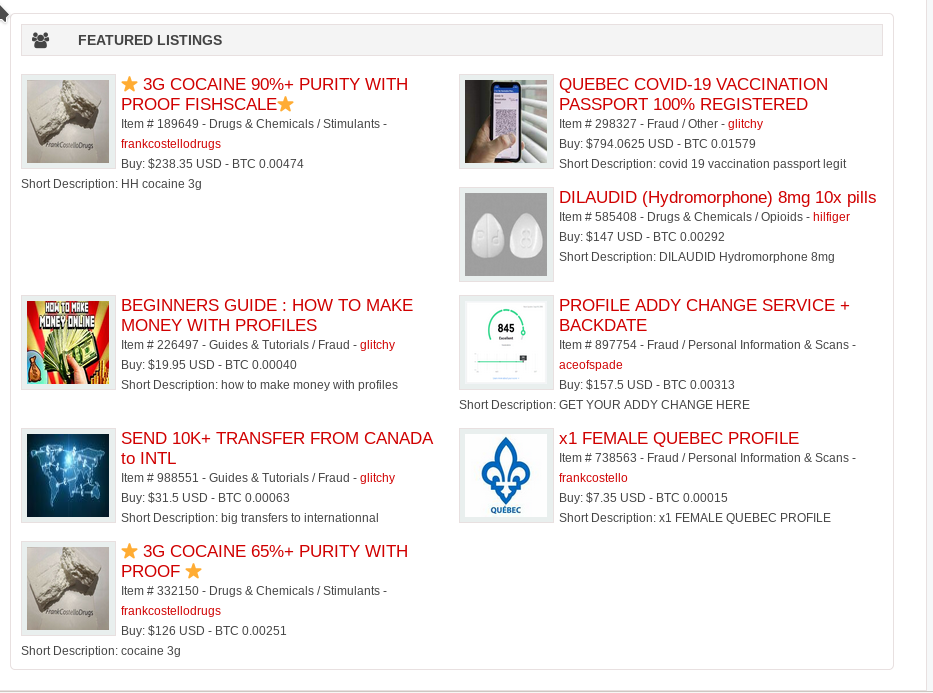In the past few years, the fascination of the deep web has gripped the interest of academics, police, and curious individuals alike. Often wrapped in enigmas, the darknet offers a unique glimpse into a hidden economy that exists beneath the surface of the internet. This shadowy realm hosts a variety of venues that trade in a wide array of digital goods and services to illicit items, luring participants with the promise of secrecy.
Diving into dark web sites reveals a complicated ecosystem where deals are conducted using cryptocurrencies and user reviews drive reputations. While some individuals may dare into these realms for innocuous pursuits, such as obtaining restricted information, others may pursue more malicious activities. Grasping the nuances of these platforms is crucial to comprehending the wider effects of the covert economy that flourishes beyond the grasp of traditional regulation and administration.
Understanding the Dark Web
The hidden web refers to a section of the internet that is not indexed by conventional search engines and demands particular tools to access. darkmarkets In contrast to the visible web, which is accessible to all with an internet connection, the dark web operates on an encrypted network, making it hard to track users and their actions. This degree of secrecy draws in a diverse group of people, including those wanting privacy and security, as well as those engaging in illicit activities.

Gaining entry to the hidden web typically involves using specialized software such as Tor, which enables users to connect to different sites without disclosing their identities. These sites often use unique website endings, creating a unique setting that differs greatly from regular online activities. While numerous users visit the dark web for valid reasons, such as bypassing restrictions or protecting confidential data, it has also become a center for illicit commerce, including the sale of drugs, weapons, and stolen data.
The hidden web consists of many markets where goods and offerings can be bought and traded under the veil of anonymity. These sites operate similarly to traditional online shopping platforms, with user reviews, product listings, and payment systems often relying on digital currencies. However, the risks and uncertainties associated with these deals are considerable, as users may face scams, law enforcement crackdowns, and serious criminal activity, highlighting the more sinister side of this hidden marketplace.
Key Dark Web Marketplaces on the Dark Web
Throughout the development of the dark web, several marketplaces have appeared as important players in the underground economy. One of the most well-known was Silk Road, which operated from 2011 until its closure by law enforcement in 2013. It became notorious for facilitating the sale of illegal drugs and other forbidden goods, operating on a model that relied heavily on Bitcoin for payments. Silk Road's ascendancy and fall set a standard for future platforms, demonstrating both the possibility for profit in the dark web and the risks of operating in a lawless environment.
Following Silk Road's closure, new marketplaces quickly took its place, including AlphaBay and Hansa. AlphaBay, which launched in 2014, grew to become one of the largest underground marketplaces until it was dismantled in 2017. It provided a wide range of illegal products and services, from narcotics to hacking tools, and introduced innovative features such as user reviews and vendor verification. Hansa, on the other hand, was targeted by law enforcement at the same time as AlphaBay, leading to a simultaneous crackdown on two major centers for dark web commerce.
In the wake of these shutdowns, new players like Dream Market and Empire Market emerged to fill the void. Dream Market operated from 2013 until 2019 and offered a platform for vendors to sell varied goods, often emphasizing user safety and anonymity. Empire Market became prominent as a successor site to previous sites, offering a large inventory while also implementing advanced security measures to protect its users. As these marketplaces keep to evolve, they highlight the persistent demand for dark web goods and the cat-and-mouse game between law enforcement and illicit online commerce.
Dangers and Legal Implications

Engaging with dark web marketplaces carries substantial risks that go far beyond the legal consequences. Users often put themselves to online threats, including viruses, hacking, and identity theft. The concealment of the dark web can create a misleading sense of security, making individuals susceptible to scams and deception. Additionally, the anonymity of transactions does not mean that users are immune to repercussions; law enforcement agencies are increasingly employing complex techniques to trace and apprehend those involved in criminal acts on the darknet.
From a legal perspective, accessing and participating in darkweb markets can lead to grave consequences. Many of the items and products offered on these platforms, such as illegal substances, firearms, and illicit information, are prohibited in most jurisdictions. Engaging in transactions on these platforms can result in criminal charges, penalties, and incarceration. Even mere possession of compromised materials linked to darkweb activities can draw the attention of law enforcement, leading to scrutiny that can destabilize careers and lives.
Furthermore, the legal landscape surrounding the darkweb is evolving, with governments implementing stricter regulations and punishments for online illicit activities. As authorities become more adept at supervising darkweb traffic and catching wrongdoers, the risks increase for anyone who attempts to traverse these unclear waters. Understanding the legal ramifications is crucial for anyone thinking about involvement, as the hidden economy comes with significant consequences that can affect individual liberties and security.
